Few actors have left as indelible a mark on cinema as Gregory Peck, whose commanding presence and moral integrity defined an era of Hollywood filmmaking. From the 1940s through the 1990s, Peck embodied characters who stood for justice, courage, and unwavering principle—qualities that mirrored his own off-screen persona. His dignified performances continue to resonate with modern audiences, offering timeless portraits of strength and humanity that feel as relevant today as when they first appeared on screen.
1. Atticus Finch in “To Kill a Mockingbird” (1962)
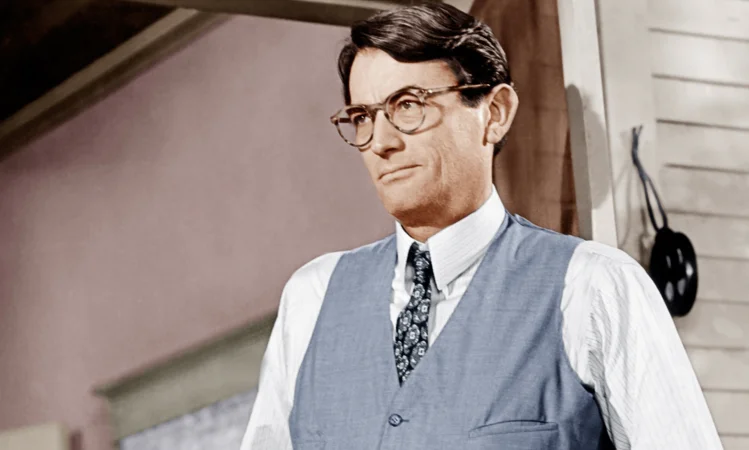
In what is widely considered one of the greatest performances in American film history, Peck’s portrayal of small-town attorney Atticus Finch earned him his only Academy Award and created the cinematic embodiment of moral courage. His quiet dignity as he defends a Black man falsely accused of assault in Depression-era Alabama showed the power of standing for what’s right even when it’s deeply unpopular. Director Robert Mulligan recalled that Harper Lee, author of the source novel, wept upon seeing Peck in costume, saying he had perfectly captured the character based on her own father. So impactful was his performance that just two years ago, Smithsonian Magazine reported on his script going up for auction.
The American Film Institute named Atticus Finch the greatest hero in American film history in 2003, cementing Peck’s interpretation as the gold standard for cinematic integrity. His famous courtroom scenes continue to be studied in law schools as examples of ethical advocacy and eloquence under pressure. More than six decades later, Peck’s performance remains the touchstone for portrayals of quiet moral leadership in film, influencing countless actors who have attempted to capture that same quality of principled conviction.
2. Captain Ahab in “Moby Dick” (1956)
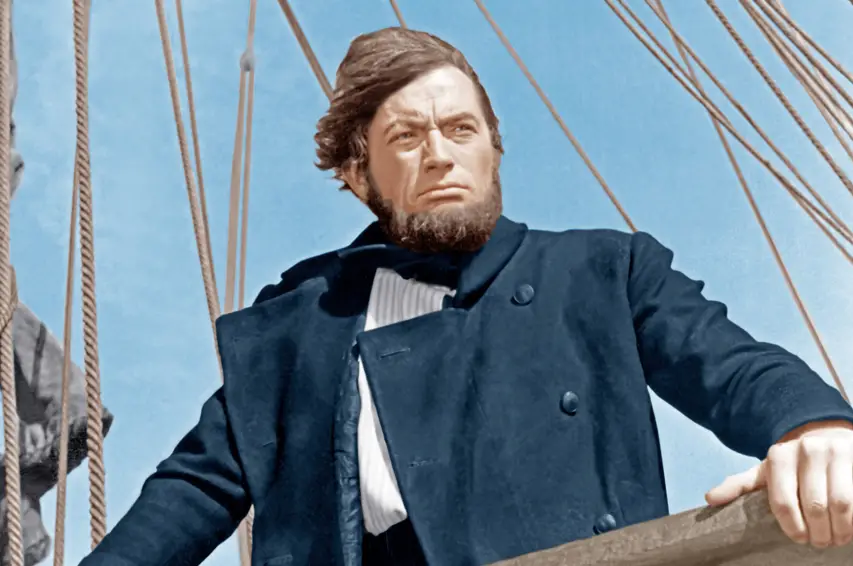
Peck’s transformation into the obsessive, vengeance-driven Captain Ahab demonstrated his remarkable range beyond the noble figures he typically portrayed. Working with director John Huston, Peck physically transformed himself with a peg leg, weathered appearance, and haunted eyes that conveyed Ahab’s all-consuming madness in his quest to destroy the white whale. Film historian David Thomson noted that this performance marked a crucial turning point in Peck’s career, proving he could embody deeply flawed, even frightening characters with the same conviction he brought to heroic roles. Classic Movie Hub takes a dive into the finer details of this remarkable adaptation led by an equally talented star.
The production was notoriously difficult, with Peck later admitting he initially felt miscast and struggled with the demanding role. Despite mixed critical reception upon release, Peck’s portrayal has grown in estimation over the decades, now recognized as a brave departure that captured the existential fury at the heart of Melville’s complex character. Modern directors like Steven Spielberg and Christopher Nolan have cited this performance as influential in their own approaches to characters driven by obsession, with Peck’s Ahab serving as a masterclass in portraying single-minded determination warped into self-destruction.
3. Joe Bradley in “Roman Holiday” (1953)
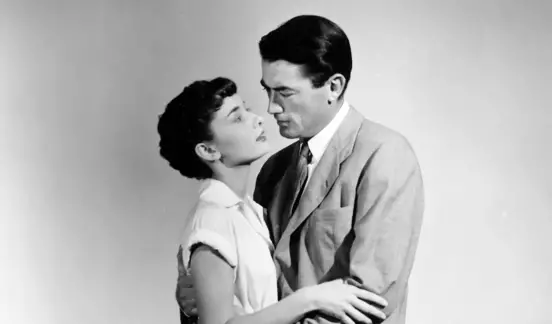
As American reporter Joe Bradley opposite Audrey Hepburn’s princess in William Wyler’s romantic classic, Peck displayed a charming lightness rarely seen in his more serious roles. His natural chemistry with Hepburn—making her film debut—helped create one of cinema’s most beloved romantic pairings, with Peck generously insisting that newcomer Hepburn receive equal billing after seeing her remarkable performance. Director William Wyler noted that Peck, known for dramatic gravitas, revealed unexpected comedic timing and romantic appeal that broadened Hollywood’s perception of his capabilities. For those a still bit unsure about the ending, Screen Rant settles once and for all the fate of our leading man and lady.
The famous Mouth of Truth scene, where Peck improvised a moment pretending his hand was bitten off (genuinely startling Hepburn into a delighted reaction), showcased his understated playfulness. His transformation from opportunistic journalist to selfless romantic lead provided the emotional core of a film that continues to rank among the most beloved romantic comedies ever made. Modern romantic leads from George Clooney to Tom Hanks have acknowledged studying Peck’s performance to understand how to convey both charm and underlying principle when portraying characters who must choose between personal gain and doing the right thing.
4. King David in “David and Bathsheba” (1951)
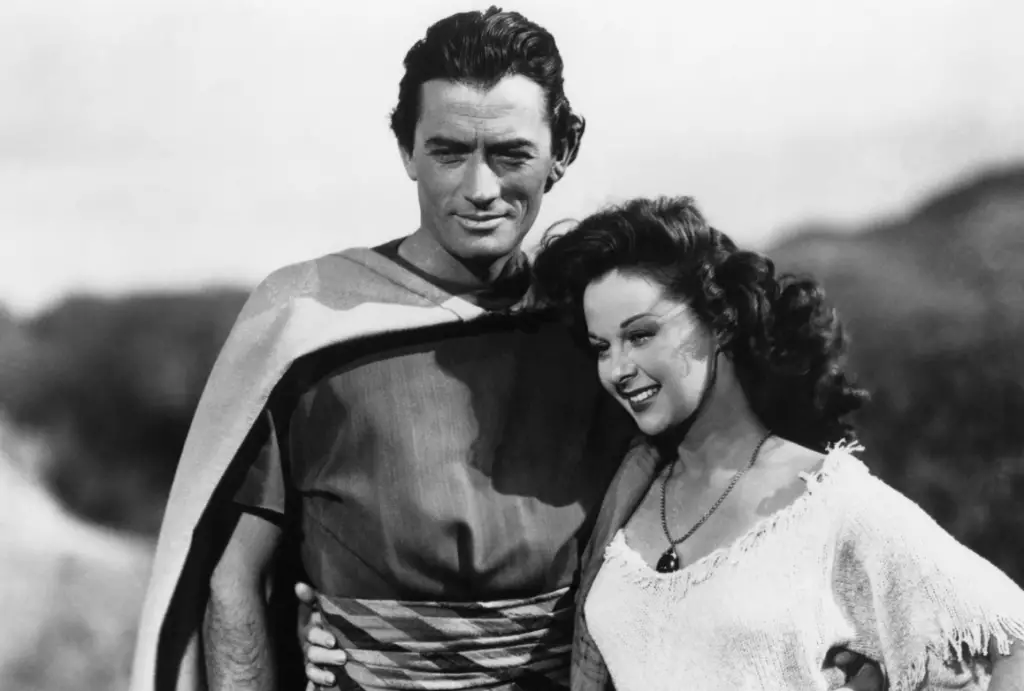
In this lavish biblical epic, Peck brought psychological depth to the legendary King David, portraying both his greatness as Israel’s ruler and his moral failure in his affair with Bathsheba. His performance humanized the biblical figure by showing David’s struggle between divine calling and human weakness, creating a nuanced portrait of power, temptation, and redemption. Director Henry King, in his second collaboration with Peck, praised the actor’s ability to maintain audience sympathy even while portraying morally compromised actions, a testimony to what King called Peck’s “inherent sense of authority and integrity.”
The film’s commercial success demonstrated Peck’s draw as a box office star who could bring gravitas to historical and biblical material without resorting to simplistic characterization. His scenes of anguished repentance after being confronted by the prophet Nathan showed Peck’s gift for conveying internal spiritual conflict through restrained yet emotionally transparent acting. While biblical epics have evolved dramatically in filmmaking style since the 1950s, contemporary portrayals of flawed biblical figures in films like “Noah” and “Exodus: Gods and Kings” build upon Peck’s pioneering approach to portraying divine instruments as fully human, with all the moral complexity that entails.
5. Jim Douglas in “The Bravados” (1958)
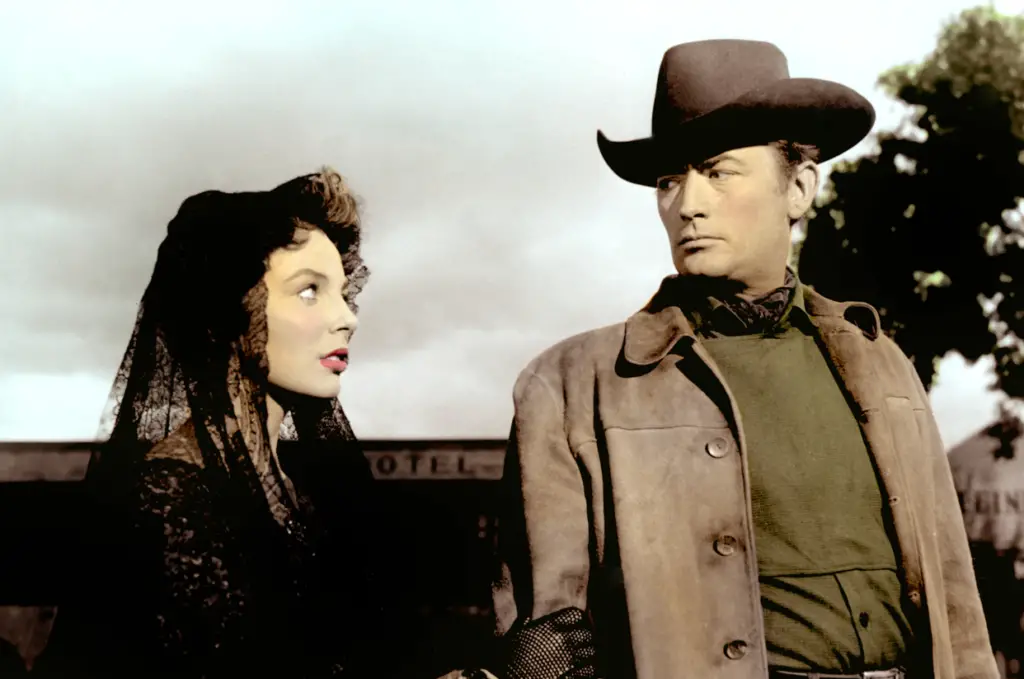
In this psychologically complex Western directed by Henry King, Peck portrayed a man consumed by vengeance who hunts down the men he believes raped and murdered his wife, only to make a devastating discovery about his own misdirected rage. His performance gradually shifted from righteous determination to horrified self-recognition as his character confronts the moral emptiness of his quest for revenge. Director King, who collaborated with Peck on six films, considered this performance among the actor’s most psychologically nuanced work, showing how hatred corrupts even the most justified grievances.
The film’s exploration of frontier justice and moral ambiguity helped elevate Western filmmaking beyond simple good-versus-evil narratives toward more complex ethical territory. Peck’s unflinching portrayal of a man forced to confront his own capacity for cruelty provided a masterclass in restrained yet emotionally devastating acting. Modern revisionist Westerns, from Clint Eastwood’s “Unforgiven” to the Coen Brothers’ “True Grit,” owe a debt to how Peck’s performance helped transform the genre from morality plays into explorations of the gray areas of human justice and redemption.
6. Captain Keith Mallory in “The Guns of Navarone” (1961)
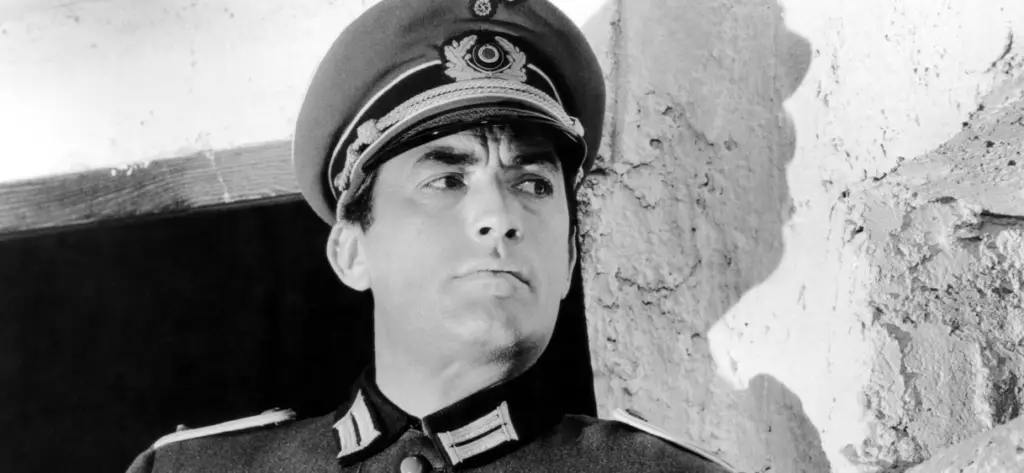
Leading an elite commando team on a seemingly impossible mission to destroy massive Nazi guns, Peck’s mountaineer-turned-soldier Captain Mallory embodied cool-headed leadership under extraordinary pressure. His performance conveyed both tactical brilliance and moral complexity as his character navigated impossible choices about sacrifice and betrayal in wartime. Director J. Lee Thompson recalled that Peck performed many of his own stunts during the difficult cliff-climbing sequences, lending authenticity to this physically demanding role while maintaining the character’s intellectual dimensions.
The film’s enormous success helped establish the modern military mission movie template, with Peck’s portrayal of a reluctant leader who makes hard decisions while maintaining his humanity becoming a touchstone for the genre. His scenes debating the ethics of killing a compromised team member with Anthony Quinn’s explosives expert created a moral framework that war films still grapple with today. From “Saving Private Ryan” to “Zero Dark Thirty,” echoes of Peck’s performance can be seen in how filmmakers portray the psychological toll of command decisions in combat situations where there are no clean moral choices.
7. Dr. Josef Mengele in “The Boys from Brazil” (1978)
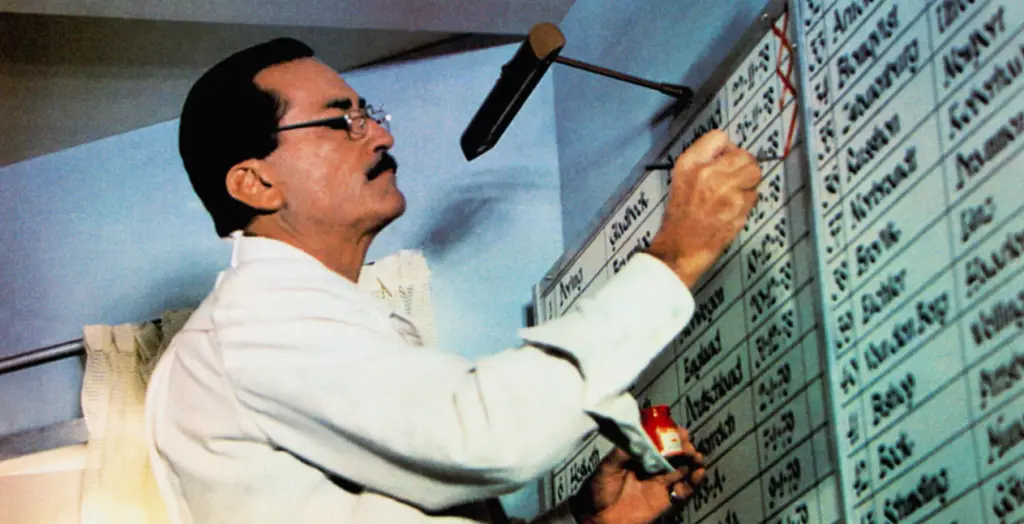
In perhaps his most chilling transformation, Peck abandoned his trademark dignity to portray Nazi war criminal Josef Mengele, orchestrating a plot to create clones of Hitler in this science fiction thriller. His unnervingly precise German accent, rigid physicality, and cold scientific detachment created a portrait of evil that was all the more disturbing coming from an actor known for playing moral champions. Director Franklin J. Schaffner reportedly had to convince a reluctant Peck to take the villainous role, which the actor finally accepted as a challenge to expand beyond the heroic characters audiences expected from him.
Peck’s meticulous research included studying footage of Nazi officers and consulting with Holocaust survivors to ensure his portrayal, while fictional in context, honored the gravity of the historical atrocities. Critics noted the brilliant casting against type, with Roger Ebert writing that “the shock of seeing Peck’s familiar, trustworthy face transformed into Mengele’s true believer creates a dissonance that deepens the film’s impact.” Contemporary actors like Daniel Day-Lewis and Christian Bale have cited Peck’s dramatic transformation as influential in their own approaches to portraying historical villains with neither caricature nor unintentional glamorization.
8. Philip Schuyler Green in “Gentleman’s Agreement” (1947)

In this groundbreaking exploration of antisemitism in post-World War II America, Peck played a journalist who poses as Jewish to write about religious discrimination firsthand, confronting both institutional prejudice and the complicity of “nice people” who enable it through silence. His righteous anger when confronting casual bigotry from friends and colleagues demonstrated Peck’s ability to convey moral outrage while maintaining his characteristic restraint. Director Elia Kazan noted that Peck’s inherent integrity made him ideal for this role, as audiences implicitly trusted his character’s ethical journey from observer to actively engaged advocate.
The film won Best Picture at the Academy Awards and was among the first major Hollywood productions to directly confront American antisemitism, with Peck later recalling it as one of his most personally meaningful projects. His performance established a template for the “social problem” films of the era, demonstrating how a mainstream star could use their audience appeal to address controversial contemporary issues. Modern issue-driven dramas continue to follow the approach pioneered in Peck’s performance—using a privileged character’s journey of discovery to make systemic injustice visible to audiences who might otherwise remain comfortably unaware.
9. Father Hugh O’Flaherty in “The Scarlet and the Black” (1983)
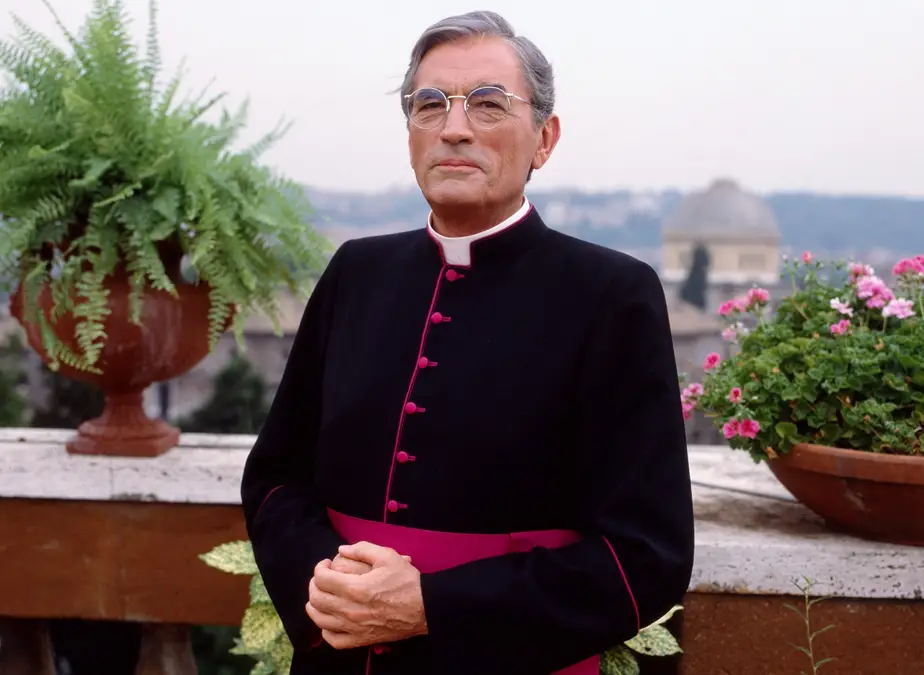
In this made-for-television film based on true events, Peck portrayed Vatican monsignor Hugh O’Flaherty, who saved thousands of Jews and escaped Allied POWs in Nazi-occupied Rome through an elaborate underground network. The role beautifully showcased Peck’s ability to convey moral courage disguised beneath a deceptively mild exterior, as his character engaged in high-stakes deception while maintaining his principles. Director Jerry London described how Peck spent time at the Vatican researching the real O’Flaherty, incorporating the priest’s passion for golf and his Irish accent into a performance that balanced spiritual commitment with practical cunning.
Peck’s cat-and-mouse scenes with Christopher Plummer’s Nazi officer conveyed the intellectual chess match between two formidable opponents with diametrically opposed moral compasses. This late-career role demonstrated Peck’s continuing relevance as an actor who could embody moral complexity within a historical framework, never reducing his character to simple heroics despite the inherently dramatic true story. Contemporary films about “righteous gentiles” during the Holocaust, including “Schindler’s List,” build upon the template established by Peck’s nuanced portrayal of how ordinary courage becomes extraordinary in times of moral crisis.
10. Cleve Van Valen in “The Big Country” (1958)
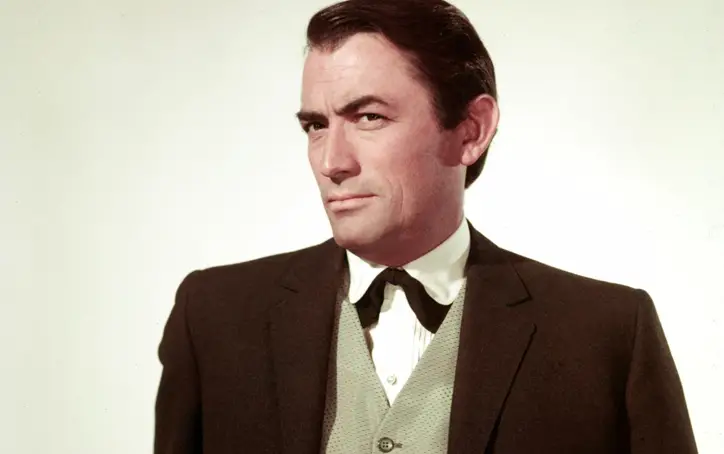
As the sophisticated but principled East Coast outsider thrust into a violent Western land feud, Peck created a new kind of Western hero who refuses to prove his manhood through public displays of violence. His famous private fight scene with Charlton Heston—where the characters battle unseen by others, purely to resolve their own conflict without audience or glory—exemplified the film’s critique of performative masculinity. Director William Wyler, collaborating with Peck for the third time, praised the actor’s ability to convey inner strength without resorting to Western genre clichés of the stoic, trigger-happy hero.
The film’s epic scope provided Peck with a showcase for his particular brand of principled resistance to societal pressure, as his character refuses to be drawn into a meaningless conflict between landed families. Peck’s performance influenced subsequent Western heroes who think before they shoot, prioritizing justice over vengeance and reason over emotion. From Kevin Costner’s Lieutenant Dunbar in “Dances with Wolves” to Christian Bale’s Dan Evans in “3:10 to Yuma,” contemporary Western protagonists who question the ethics of violence while maintaining their core principles carry forward the template established by Peck’s thoughtful performance.
11. Harry Bannerman in “Man with a Million” (1954)
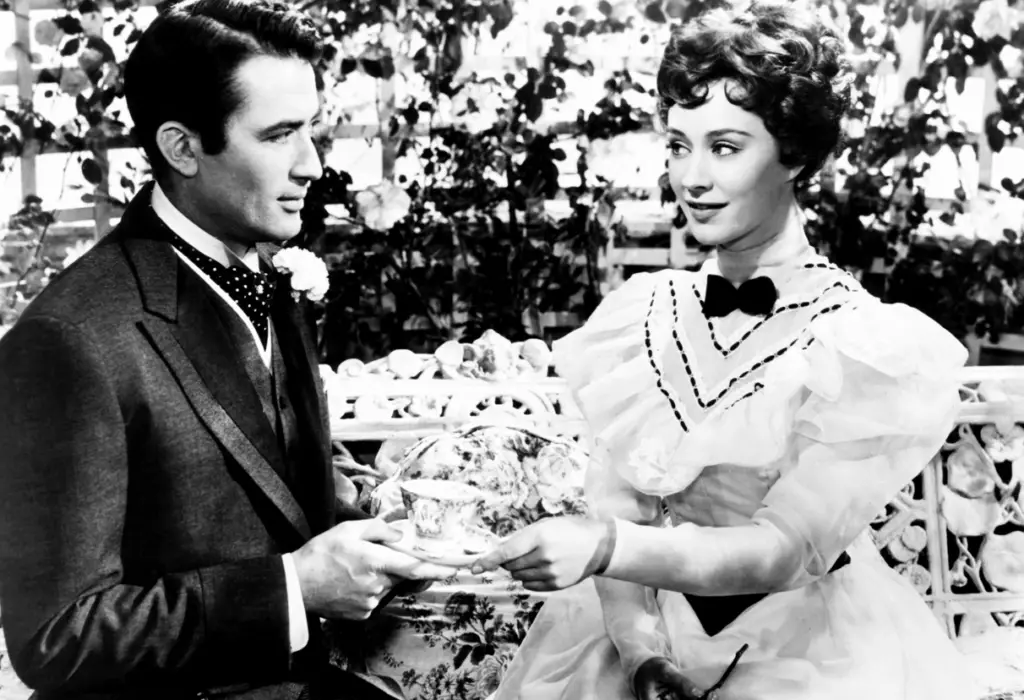
In this delightful adaptation of Mark Twain’s “The Million Pound Bank Note,” Peck displayed rarely-seen comedic talents as a penniless American in London who is given a million-pound note as part of a secret wager between two wealthy brothers. His bewildered reactions as his mere possession of the uncashable note opens doors to high society showcased a self-deprecating humor that contrasted with his more famous dramatic roles. Director Ronald Neame recalled that Peck’s natural dignity made the fish-out-of-water comedy even more effective, as audiences enjoyed seeing his typically composed persona navigate increasingly absurd social situations.
The performance highlighted Peck’s ability to use his imposing physical presence for comedic effect, particularly in scenes where his character tries to hide his humble origins among the British aristocracy. The film’s gentle satire of wealth, class, and appearance versus reality gained depth through Peck’s ability to maintain his character’s core decency amid growing temptations to exploit his unusual situation. Modern “impostor comedies” from “Trading Places” to “The Wolf of Wall Street” echo elements of Peck’s performance, particularly his ability to portray an ordinary man’s complex reaction to suddenly being treated as extraordinary based solely on perceived wealth.
12. General Douglas MacArthur in “MacArthur” (1977)
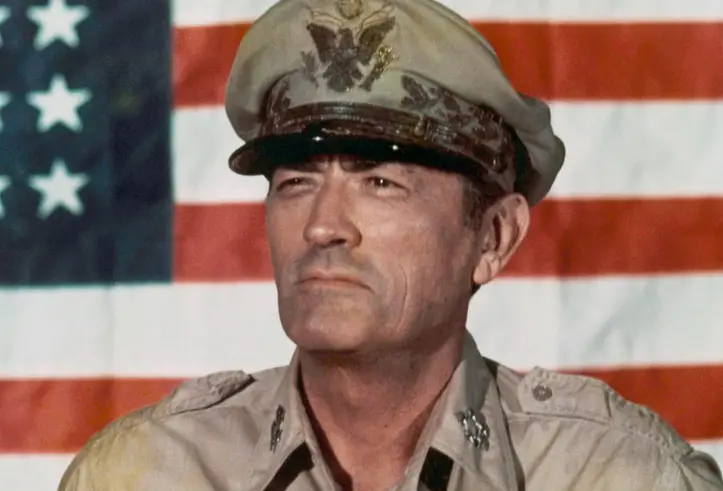
Peck’s portrayal of the controversial World War II general and Korean War commander captured both MacArthur’s strategic brilliance and his problematic ego in a performance that neither lionized nor demonized its complex subject. His meticulous study of MacArthur’s distinctive speaking style, physical bearing, and mannerisms created an uncanny evocation of the general’s public persona while suggesting the private insecurities behind the famous corncob pipe and aviator sunglasses. Director Joseph Sargent praised Peck’s refusal to simplify MacArthur into either hero or villain, instead creating a nuanced portrait of how personal ambition can both serve and undermine public service.
The performance is particularly notable for how Peck balanced MacArthur’s genuine military achievements with his insubordination toward President Truman, showing how the same confidence that made him an effective commander ultimately led to his downfall. Peck later cited this role as among his most challenging, requiring him to find the humanity in a figure whose outsized self-regard often made him appear more symbol than man. Contemporary biographical films about controversial military and political figures, including “Patton” and “Lincoln,” follow Peck’s approach of embracing complexity rather than delivering either hagiography or condemnation.
13. Sam Bowden in “Cape Fear” (1962)
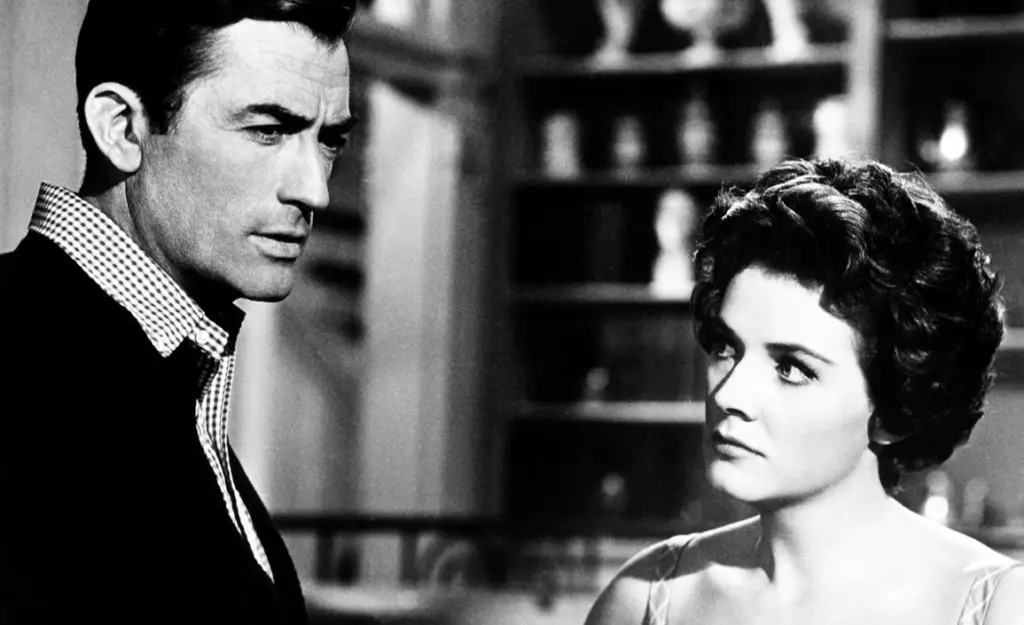
As a small-town lawyer terrorized by a released convict he helped imprison, Peck inverted his typical heroic persona to portray a man whose civilized restraint becomes a liability when facing a primal threat to his family. His performance tracked the character’s uncomfortable journey from law-abiding citizen to a man capable of violence when pushed beyond moral limits by Robert Mitchum’s chilling ex-con. Director J. Lee Thompson specifically sought to undermine Peck’s established screen persona, creating tension by placing cinema’s moral compass in a situation where legal ethics clash with primal protective instincts.
The film’s exploration of how far a “good man” might go when the legal system fails to protect his family gained power from Peck’s established association with legal integrity through Atticus Finch. His scenes of escalating fear and moral compromise offered a disturbing counterpoint to his more famous portrayal of unwavering principle. Martin Scorsese’s 1991 remake explicitly acknowledged the power of the original casting by inverting it—casting Robert De Niro as the villain and Nick Nolte as the lawyer—but the psychological impact of seeing Gregory Peck’s moral certainty unravel remains the more disturbing exploration of how civilization’s veneer can crack under sufficient pressure.
Gregory Peck’s legacy lives on not just in these individual performances but in how they collectively defined a certain kind of American masculinity—thoughtful, principled, and willing to stand alone when necessary. In an era of increasingly complex anti-heroes and morally ambiguous protagonists, his performances remind us of the power of conviction portrayed without simplistic moralism. As film historian David Thomson observed, “In Peck’s finest moments on screen, you don’t just believe in his characters; you believe in the very possibility of human decency itself”—perhaps explaining why, decades after his death in 2003, his performances continue to resonate as powerfully as ever.


